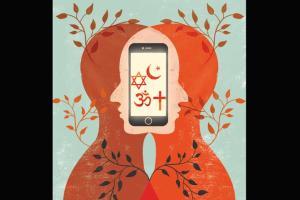How will these understandings of the past and the future, be in conversation or concert with other, varying visions as everyone pushes for a change?

Illustration/Uday Mohite
![]() In the last week of this decade I listened, at Azad Maidan, to a young man from Jamia Millia, speak with clarity and eloquence about a vision of India: a place where one exists with one's complete identity (shaksiyat). A Muslim with his dadi-topi, kurta-pyjama, al-hamdulila and bismillah, Sikhs with kirapan and turban, Hindus with Jai Shri Ram and ritual prayers. I noted the default masculine, but knew the women of Shaheen Bagh, were its parallel counter and modification.
In the last week of this decade I listened, at Azad Maidan, to a young man from Jamia Millia, speak with clarity and eloquence about a vision of India: a place where one exists with one's complete identity (shaksiyat). A Muslim with his dadi-topi, kurta-pyjama, al-hamdulila and bismillah, Sikhs with kirapan and turban, Hindus with Jai Shri Ram and ritual prayers. I noted the default masculine, but knew the women of Shaheen Bagh, were its parallel counter and modification.
The tussle between who we are and who we are allowed to be, at multiple levels, is an eternal one. Each generation, experiencing its unique contexts and innovations, throws up new iterations.
ADVERTISEMENT
As the promised aspirations of liberalisation revealed themselves to be limited to only a few, we have found ourselves in increasingly authoritarian times. The Internet is emblematic of this. From a place of fluid exploration, where those who didn't fit in went to work, love, play and create newness, it became a place of control, surveillance, binaries, followers—capitalist engineering pretending to be freedom. Political mirrored, by shrill insistence on majority, conformity, homogeneity—fascism pretending to be democracy.
Now we see a revolt against masks, the breaking of false promises built on fake premises. The saas-bahu era of barbed euphemisms, is suddenly countered with a frank expression and assertion of identity—whether Muslim or Adivasi or Dalit. The digital word wars are being heavily replaced, by offline political and cultural activity and expression.
The constant references to colonial history, whether in a play like Jamiawala Bagh or in the pinpoint comparison between the colonial reserves for denotified tribes with the government's planned detention centres, also points to a new iteration of the discussion around what it means to be secular, democratic and national. The protests against the Citizenship Amendment Act has expanded to become something very fundamental, but with a very different leadership too.
Earlier notions of the secular Indian, while accepting the co-existence of religions, cohered around a figure, seen as modern and progressive through a dilution or disavowal of religious and regional identity—interfaith marriages (not so much inter-caste), children with Sufiyana names, an emphasis on rationality. Implicit here, was that identifiably religious or regional identities were somehow narrow and backward. The modern individual was a hybrid of the old and new for whom culture was a consumable heritage. In older Hindi films such figures were hero-heroine surrounded by a cast of lesser, stereotypically 'desi', costumed figures, as if pant-shirt and sari are not, also, costumes, masking the unremarked identity of being upper caste, usually North Indian.
Contemporary discussions are shrugging off this hybridity for heterogeneity: where we might be strongly rooted in religious identity, while partaking of all kinds of markets, politics, books, clothes, sexualities and relationships. The leaderless nature of this movement, where women, students, Dalits, Adivasis, queer groups, trans groups protest both, concurrently across locations, as well as leading in turns at common locations like Jantar Mantar mirrors this. There is a surge towards self-determination and a move away from the idea of nation as identity and entity, versus nation as a place we call home and can be ourselves.
How will these understandings of the past and the future, be in conversation or concert with other, varying visions as everyone pushes for a change? What will be the contours of this new plurality? A decade awaits curiously, some newer, truer promises based on new premises.
Paromita Vohra is an award-winning Mumbai-based filmmaker, writer and curator working with fiction and non-fiction. Reach her at paromita.vohra@mid-day.com
Catch up on all the latest Crime, National, International and Hatke news here. Also download the new mid-day Android and iOS apps to get latest updates
 Subscribe today by clicking the link and stay updated with the latest news!" Click here!
Subscribe today by clicking the link and stay updated with the latest news!" Click here!







